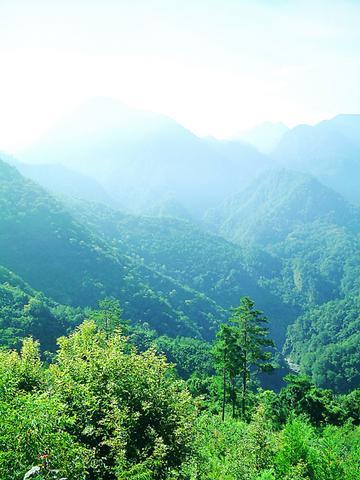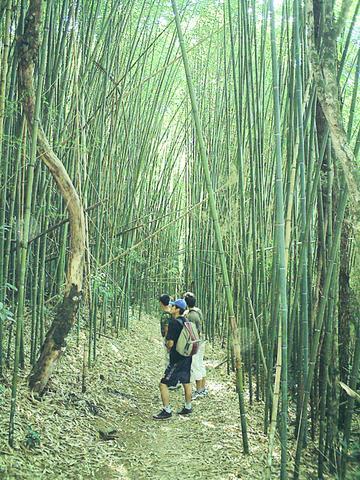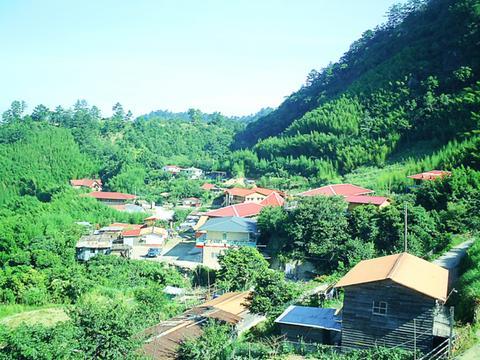As an envisioned mountain retreat, the Atayal tribal village Smangus will have little competition in offering quiet isolation. By the villagers's own description, the hamlet is "the most isolated place in Taiwan," a slogan the residents evoke with obvious pride.
Being the most isolated community in the country wasn't always a point of pride, though. For decades the tiny village deep in the lush mountains of Hsinchu County was known as a "black tribal village" (

PHOTO: MAX WOODWORTH, TAIPEI TIMES
But now, tapping a spirit of tribal communalism, the village is attempting to reverse its fortunes by pooling its limited resources to transform what was previously a cluster of run-down hovels into a picturesque alpine idyll that will attract deep-pocketed city-dwellers in search of fresh air and a nearby grove of cypress trees that are up to 2,500 years old.

PHOTO: DAVID MOMPHARD, TAIPEI TIMES
Returning home
People began leaving the village in 1983. By 1989, only seven households remained. However, the introduction of foreign laborers into the workforce in the early 1990s squeezed many Aboriginal migrants out of low-skill factory jobs and forced many to return to their ancestral homes.

"Our people are coming home. We're up to 22 households now, with 141 permanent residents," said Yuraw, one of the town's elders. "Only one household still lives in the valley."The rapid repopulation of Smangus and the completion in 1994 of the first semi-paved road into the village set several forces in motion that seem to have given the tribe a new lease on life.

The road allowed for what began as a trickle of visitors to grow into the scores of hikers who every weekend brave the perilous three-hour drive through stunning gorges to reach Smangus.
Meanwhile returnees brought home with them some of their savings, or, at the very least, returned with the bitter experience of life as second-class citizens in the cities. From this arose a dedication to reinvigorate traditional Atayal life in the mountains among their own people.
Another impetus for returning, according to residents, was the elders' call for the tribe to come back to Smangus to rebuild the village and preserve Atayal culture.
"Atayal life is communal. People in the valley are different and it's hard for us. Like when we kill a mountain pig, the whole tribe gets a piece of meat. Individual ownership of property is superceded by the needs of the community," Yuraw said.
In this vein, the tribe devised a tourism development plan in which its assets are communally owned and operated. The idea arose in part as a natural application of the tribe's tradition, but also after witnessing the experience of Baling and Lishan, both less successful models of Aborigine hamlets turned into tourist destinations.
"We didn't want competition for tourism business to emerge between residents of Smangus. We saw from Baling and Lishan's experience that once tribe members are pitted against each other the community degenerates into a situation where some are big winners but most end up big losers. The end result is that the losers sell their land to Chinese and for us this is unacceptable," Yuraw said.
The loss of tribal lands through deals made during dire economic circumstances remains a sore point for the Atayal and indeed most Aboriginal tribes, but Smangus has turned away every offer to sell even small parcels of its land. And there have been many offers.
"Ever since the road was built and the tourism potential of this place became clear, we had Chinese people come up here literally with suitcases full of cash making wild offers," said Masay (
The restriction on selling land is just one of the fundamental rules to life in Smangus. There is also a blanket ban on alcohol, which has ravaged many Aborigine communities, and a locally dictated building code that demands that wood be the primary building material of all structures in the village.
Though some tourists complain about the alcohol ban, it is not a point on which the tribe plans to compromise.
"They want to keep harmful influences out of the village to protect themselves. Part of the alcohol ban is an observance of their religious beliefs, but it's also the tribe sticking together for the greater good of the community," said Minister Yabu, whose Presbyterian church serves the entire tribe. Smangus converted to Christianity about 50 years ago under an order of the tribe's former leader.
The insistence on abandoning concrete in favor of wood for the village's homes and buildings is a conscious attempt to give Smangus the quaint, rustic appearance that tourist traps like Baling and Lishan have been unable to create.
An experiment underway
With its alternative business plan, ubiquitous tribal empowerment theme and heavy-handed aesthetic regime, Smangus is an experiment that is beginning to bear fruit.
Several newly completed hostels in a Swiss chalet style can house up to 200 people a night and a recently finished town hall-cum-restaurant now serves as the centerpiece of the village.
Recently, the growing influx of visitors has even forced a community debate on ways of limiting numbers.
"We'd like to cap the number of outsiders in the village at any given time at 250. Otherwise the impact on the natural environment, especially the cypress grove that most people come to see, will be harmful. Too many visitors would also upset the pace of life here," Yuraw said.
The village elders are close-mouthed on the income earned by the hostels and restaurant, but say that currently tourism accounts for about 60 percent of the village's income, though a greater percentage than that of villagers is employed in the sector. The rest of the workers in the village are involved in growing vegetables and maintaining the 8-year-old peach orchard, which is viewed as another potential draw for tourists in about five years when the trees begin producing mature fruit. Some villagers work keeping the road to the village clear of boulders. Changes in work duties are discussed once a year if people wish to switch jobs.
As for dividing what income the village earns, workers receive a cut that is proportionate to the amount they initially invested, if they invested anything at all.
According to Masay, no one was required to invest any money when they first returned. The only stipulation was that returnees be directly related to the tribe through a first relative. On that basis alone, people could be part of the commune. But those who invested more have received more in return.
"There aren't huge profits in what they're doing. Their objective instead is to establish a stable and dignified lifestyle that the next generation will be proud to adopt rather than simply flee to live in the cities," said Lee Yu-pei (
Maybe the best indicators of the success of the tribe's development model are the presence in the village of all the generations of each family and the predominant usage of the Atayal language, even among the village's teenagers and young people whose schooling is almost entirely in Mandarin.
The village isn't in a rush to become a tourist haven, though. First it needs to overcome some basic hurdles, such as finally getting the road to the village paved and getting a terrestrial telephone line to hook up a fax machine. Until then, it will retain its well-deserved moniker as the most isolated spot in the country.

April 14 to April 20 In March 1947, Sising Katadrepan urged the government to drop the “high mountain people” (高山族) designation for Indigenous Taiwanese and refer to them as “Taiwan people” (台灣族). He considered the term derogatory, arguing that it made them sound like animals. The Taiwan Provincial Government agreed to stop using the term, stating that Indigenous Taiwanese suffered all sorts of discrimination and oppression under the Japanese and were forced to live in the mountains as outsiders to society. Now, under the new regime, they would be seen as equals, thus they should be henceforth

Last week, the the National Immigration Agency (NIA) told the legislature that more than 10,000 naturalized Taiwanese citizens from the People’s Republic of China (PRC) risked having their citizenship revoked if they failed to provide proof that they had renounced their Chinese household registration within the next three months. Renunciation is required under the Act Governing Relations Between the People of the Taiwan Area and the Mainland Area (臺灣地區與大陸地區人民關係條例), as amended in 2004, though it was only a legal requirement after 2000. Prior to that, it had been only an administrative requirement since the Nationality Act (國籍法) was established in

With over 80 works on display, this is Louise Bourgeois’ first solo show in Taiwan. Visitors are invited to traverse her world of love and hate, vengeance and acceptance, trauma and reconciliation. Dominating the entrance, the nine-foot-tall Crouching Spider (2003) greets visitors. The creature looms behind the glass facade, symbolic protector and gatekeeper to the intimate journey ahead. Bourgeois, best known for her giant spider sculptures, is one of the most influential artist of the twentieth century. Blending vulnerability and defiance through themes of sexuality, trauma and identity, her work reshaped the landscape of contemporary art with fearless honesty. “People are influenced by

Three big changes have transformed the landscape of Taiwan’s local patronage factions: Increasing Democratic Progressive Party (DPP) involvement, rising new factions and the Chinese Nationalist Party’s (KMT) significantly weakened control. GREEN FACTIONS It is said that “south of the Zhuoshui River (濁水溪), there is no blue-green divide,” meaning that from Yunlin County south there is no difference between KMT and DPP politicians. This is not always true, but there is more than a grain of truth to it. Traditionally, DPP factions are viewed as national entities, with their primary function to secure plum positions in the party and government. This is not unusual